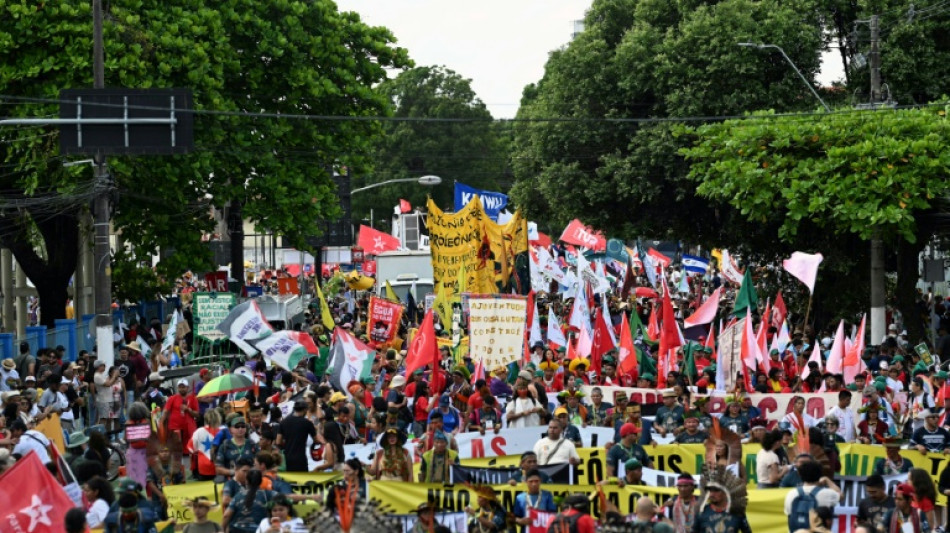

Climate protesters rally in Brazil at COP30 halfway mark
Thousands of people marched through the streets of Belem on Saturday to press for action from negotiators holding tough talks at the UN's COP30 climate conference in the Amazonian city.
Under a baking sun, Indigenous people mixed with activists gathered in a festive atmosphere, blasting music from speakers, carrying a giant beach ball of Earth and holding a flag of Brazil emblazoned with the words "Protected Amazon."
It was the first major protest outside the annual climate talks since COP26 four years ago in Glasgow, as the last three gatherings were held in locations with little tolerance for demonstrations -- Egypt, Dubai and Azerbaijan.
Branded the "Great People's March" by organizers, the Belem rally comes at the halfway point of contentious negotiations and follows two Indigenous-led protests that disrupted proceedings earlier in the week.
"Today we are witnessing a massacre as our forest is being destroyed," Benedito Huni Kuin, a 50-year-old member of the Huni Kuin Indigenous group from western Brazil, told AFP.
"We want to make our voices heard from the Amazon and demand results," he said. "We need more Indigenous representatives at COP to defend our rights."
Tyrone Scott, a 31-year-old Briton from the anti-poverty group War on Want, said it was an "Indigenous-led, movement-led, people-powered march."
"It's just really exciting and a little bit of a nice antidote to the staleness and sterileness of the inside of the COP," Scott told AFP.
Their demands include "reparations" for damage caused by corporations and governments, especially to marginalized communities.
Some also held a giant Palestinian flag and "free Palestine" banner. One protester on stilts dressed as Uncle Sam denounced "imperialism."
After a 4.5-kilometer (2.8-mile) march through the city, the demonstration was due to stop a flew blocks from the COP30 venue, where authorities have deployed soldiers to protect the site.
On Tuesday, Indigenous protesters forced their way into the Parque da Cidade -- the COP30 compound built on the site of a former airport -- clashing with security personnel, some of whom sustained minor injuries.
Then on Friday, dozens of Indigenous protesters blocked the entrance for roughly two hours to spotlight their struggles in the Amazon, prompting high-level interventions to defuse the situation.
- Love letters and therapy -
Inside the venue, talks are delicately poised.
At the close of the first week of negotiations, the Brazilian presidency of COP30 is expected to unveil its strategy on Saturday for reconciling countries' demands.
The top issues include how to address weak climate goals and how to improve financial flows from rich to poor countries to build resilience against a warming world and transition to low-emission economies.
So-called trade barriers, such as Europe's carbon border tax, have emerged as a key contention, as has the issue of whether to set timelines and targets for the transition away from fossil fuels.
Several participants believe that negotiators are holding firm to their positions while awaiting the arrival next week of government ministers, who must reach an agreement by the conference's end on November 21.
An African negotiator hoped the presidency would take the lead, "otherwise this could turn out to be an empty COP," he said, contrasting with the optimism expressed by others.
The "parties are here to get a positive outcome," German State Secretary Jochen Flasbarth said.
Another Western diplomat said the Brazilian presidency had urged countries to treat their consultations as "therapy sessions" -- a safe space to air concerns.
Delegations were also encouraged to send private submissions describing how they felt the talks were progressing, which the Brazilians referred to as "love letters."
"These negotiations, they are like a roller coaster sometimes, you know, they are up, sometimes they are down," summarized Brazil's chief negotiator, Liliam Chagas.
F.Fuentes--ECdLR




